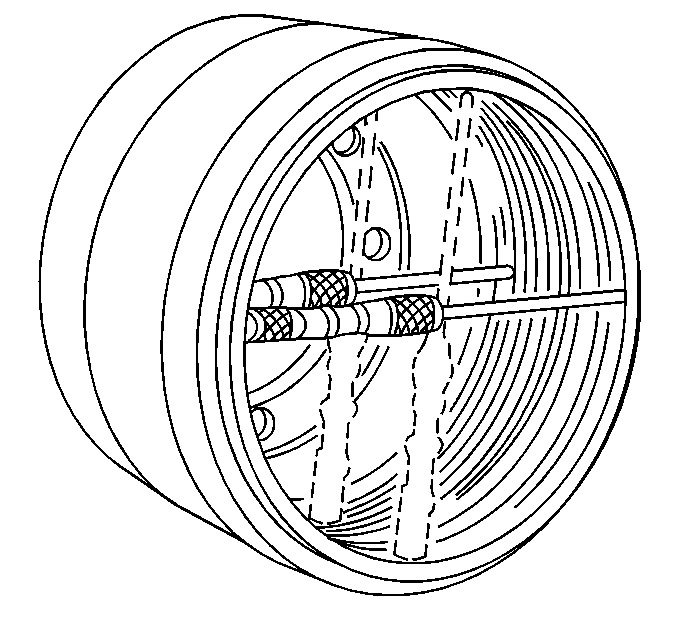Cracked, Scored or Grooved
A cracked brake drum is unsafe for further service. Replace a cracked brake drum. Do not attempt to weld a cracked brake drum. Smooth up any slight scores. Replace the brake drum if heavy or extensive scoring is present.
Polish the brake drum with a fine emery cloth. Do not refinish the brake drum if the brake linings are only slightly worn and the brake drum is only slightly grooved. Eliminating all grooves in the brake drum and smoothing the ridges on the brake lining would require removing too much metal and brake lining. If the components are left alone, the grooves and the ridges will match and should perform adequately.
Always replace a grooved brake drum when you are replacing the brake linings. Using a new brake lining with a grooved brake drum will cause brake lining wear and improper performance.
Out-of-Round or Tapered Brake Drum
An out-of-round or tapered brake drum can cause the following conditions:
| • | Inaccurate brake shoe adjustment |
| • | Excessive wear of other brake parts |
| • | Severe and irregular tire tread wear |
| • | A pulsating brake pedal |
Out-of-round and tapered brake drums may be accurately assessed with an inside micrometer and extension rods. Take the measurements at the open and closed edges of the machined surface, at right angles to one other. Replace the brake drum when the brake drum exceeds the specification limits for taper and/or out-of-round.
Inside Diameter Check
Perform the following checks prior to major vehicle servicing:
- Measure the braking surface for maximum allowable diameter.
- Measure the braking surface for out-of-round.

Fading or overheating brakes can be caused by an oversized brake drum.
| 1.1. | Measure the brake drum diameters at four equally-spaced points near the middle of the braking surface. |
| 1.2. | Replace the brake drum if any diameter is at, or more than, the maximum discard diameter stamped into the brake drum. |
Chatter at the wheels can be caused by out-of-round brake drums.
| 2.1. | Measure the brake drum diameters at four equally-spaced points near the middle of the braking surface. |
| 2.2. | Replace the brake drum if any diameter readings are more than 0.38 mm (0.015 in) apart. |
Taper Check
- A tapered or barrel-shaped brake lining will cause uneven brake drum wear.
- Measure the brake drum diameters at four equally-spaced points near the top of the braking surface.
- Average the 4 measurements in order to obtain an average diameter near the top of the braking surface.
- Measure and average four diameters at the middle of the braking surface.
- Measure and average four diameters at the bottom of the braking surface.
- Compare the four average diameters in order to determine if the brake drum is tapered or barrel shaped.
- Replace the brake drum if any of the average diameters are more than 0.25 mm (0.010 in) apart.
New Replacement Brake Drum Refinishing
Do not refinish the braking surface when installing new brake drums. These components are already at the correct level of surface finish.
Balance
Weights are used in order to balance the brake drums during manufacturing. Do not remove the weights. Replace the brake drum if the weights are missing.
